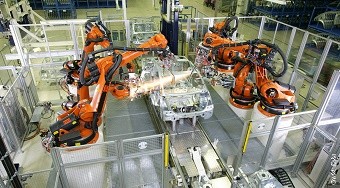The surging trend in robotics in China may see a decline in two years due to the industry’s underlying deficiencies, according to Southern Weekly, a newspaper based in Guangzhou.
According to the report, the strong support of government has largely contributed to the upswing, as the "China manufacturing 2025" program, presented by the State Council, has identified robotics as one of the 10 key sectors for priority development.
The report said that the country's goal is to become one of the world's manufacturing powers by 2025, and after the announcement of the program, the stock prices of more than 10 robotics firms have surged the next day.
China has been the world's largest market for robots for two years, as robot shipments in the country have reached 56,000 units last year, accounting for one-fourth of the total global shipments.
Chinese firms have been trying to produce robots for the huge local demand, but the robotics industry in China is still an emerging industry and the development of the key components and parts for domestic production has yet to start.
One of China's robot manufacturers, Guangdong Bo Langte Intelligent Equipment, founded by Ying Rongzhao, a former salesman at a Taiwanese-invested robotics firm, has increased its robot sales in 2011 after labor costs increased and Chinese factories were plagued by labor shortages.
In early 2014, the company, together with 265 other small domestic firms, listed its shares, which boosted its financial strength and raised its market value to 1 billion yuan ($161 billion) now. The report said that the company's share price now fluctuates around 30 yuan ($4.80); in 2014, the company's sales hit 83 million yuan ($13.4 million).
SIASUN Robot & Automation, a leading robotics firm founded in 2000 and an offshoot of Shenyang Institute of Automation under the Chinese Academy of Sciences, has a market value of 82 billion yuan ($13.2 billion) as of June 2, with sales topping 1.5 billion yuan ($242 million) in 2014.
The report said that despite the rising trend in robotics, the industry has not established itself firmly, according to insiders. Experts said that many large firm buy small robotic firms only to benefit from the high share prices, without knowledge of R&D and talent cultivation.
The experts said that many firms in the robotic industry will be phased out in two years unless they know the core technology.






















